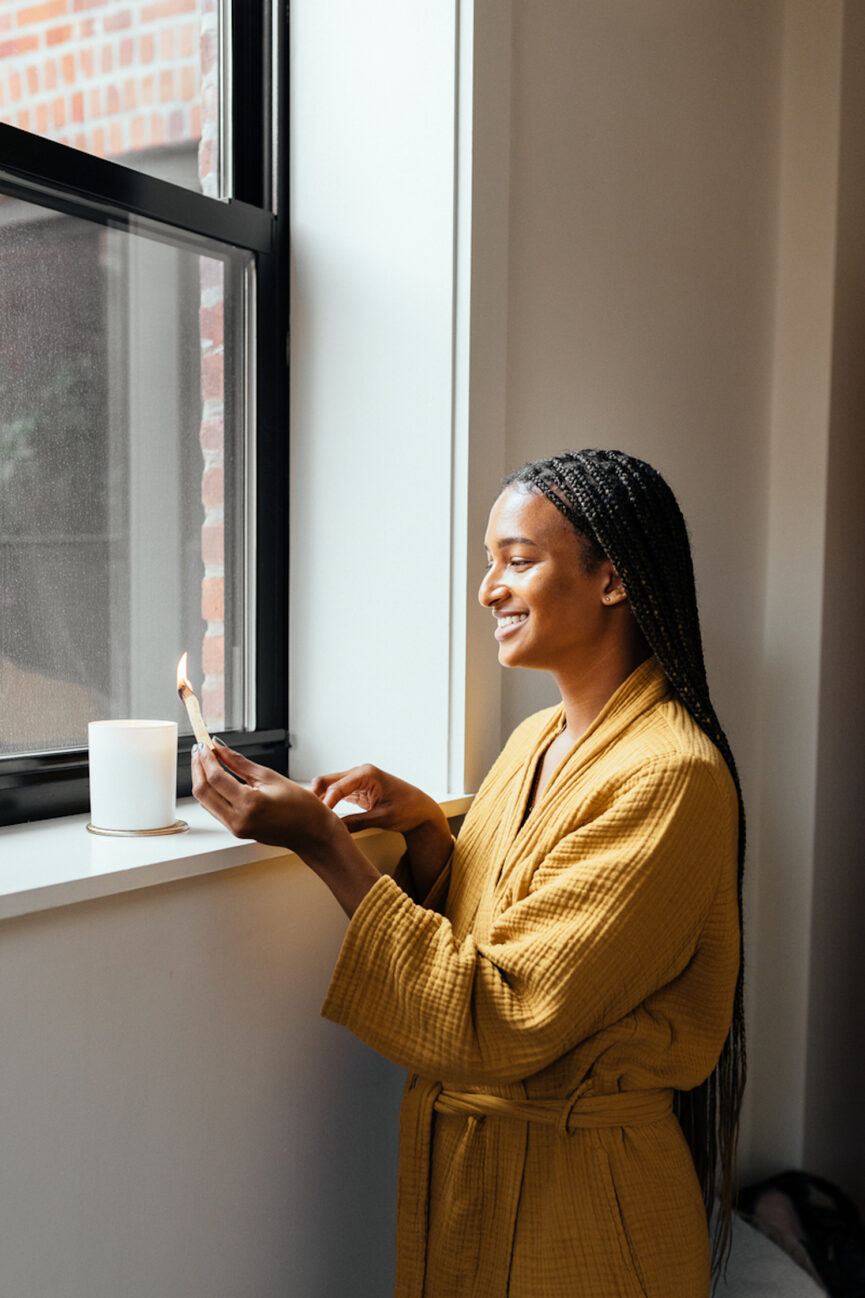I used to treat my life like a spreadsheet—color-coded, optimized, and every hour accounted for. If I could just find the right ratio of work to rest, ambition to stillness, I thought I’d arrive at some mythical version of balance. But the harder I tried to control it, the more elusive it became.
For years, I believed balance meant perfect proportion: work and rest, ambition and stillness, discipline and ease. But lately, I’ve realized that balance isn’t the tightrope walk we’ve been told it is. It’s more of a softened discipline—an intentional equilibrium that holds space for both structure and surrender. It’s choosing what matters, while letting go of the illusion that everything should weigh the same.
Featured image from our interview with Claire Zinnecker by Michelle Nash.


How 30 Days of Soft Mornings Transformed the Way I View My Routine
In practice, that’s looked like aligning my days with my values rather than arbitrary benchmarks. Annie Dillard was right: “How we spend our days is, of course, how we spend our lives.” A walk counts as much as an email sent. Time with a book matters as much as time in a meeting.
The life I want isn’t built in giant leaps but in the quiet accumulation of these choices—the ones that make my hours feel like my own.
For years, I bought into the myth that mornings had to be rigid, productive, and relentlessly optimized. But when I gave myself permission to slow down, I discovered something far more nourishing: space to actually feel awake before the world demanded anything of me.
This story isn’t just about what shifted in my own life—it’s about how you can reshape your mornings, too. Ahead, I’ll share what soft mornings are, why I abandoned my 5 a.m. alarm, and how 30 days of this practice transformed the way I move through my day.
What are soft mornings?
Soft mornings are about beginning the day with gentleness rather than urgency. They’re not about hitting snooze until noon or tossing discipline out the window, but about creating space to arrive and orient yourself to the day.
Instead of rushing to check notifications or diving straight into productivity mode, a soft morning prioritizes sensory rituals—the smell of coffee, a few quiet minutes on the porch, or the feel of a blanket pulled around your shoulders. It’s a conscious rejection of control in favor of presence.
When you let softness lead, your mornings become less about achieving and more about attuning. You move from “How much can I get done before 9 a.m.?” to “What do I need to feel grounded as I begin?” For me, that shift changed everything.
Why I Gave Up My 5 A.M. Routine
For years, I bought into the idea that the earlier I woke up, the more successful I’d be. The 5 a.m. club promised productivity and a head start on the rest of the world. And while it did give me more hours, those hours often felt hollow—spent checking boxes rather than nourishing myself.
I began to notice that rigidity was making me brittle. My mornings were efficient, yes, but they left little room for the messiness of being human. A bad night’s sleep meant the entire day felt like a failure. And if I didn’t follow my routine perfectly, the guilt would creep in.
Instead, soft mornings helped me invite presence into my life. To see my mornings not as a race against the clock but as an invitation to slow down. And in doing so, I discovered that discipline doesn’t always mean pushing harder. Sometimes, it looks like loosening your grip.
What Changed
After 30 days, the most immediate shift was in my energy. Ironically, when I stopped forcing myself to get up at 5 a.m., I actually felt more awake. Giving myself permission to sleep until my body was ready meant I began my days rested rather than depleted.
My focus also sharpened. Without the frantic scramble to make mornings “productive,” I entered work with a clearer mind. Those first slow moments—stretching, journaling, sipping tea—acted like a buffer, softening the transition from rest to responsibility.
And perhaps most importantly, my mood lifted. I felt less reactive, less anxious. There was a steadiness to my days that hadn’t been there before—a quiet confidence that came from knowing I was living in alignment with what I actually needed, rather than what some productivity expert told me I should want.
What Didn’t Change (and Why That’s Okay)
I’ll be honest: soft mornings didn’t make me superhuman. I didn’t suddenly become endlessly patient, and I didn’t eliminate stress entirely. Some mornings, I still reached for my phone first thing. Some mornings, I skipped my walk or rushed out the door.
And that’s the point. Soft mornings aren’t about perfection—they’re about permission. They’re a reminder that even when things don’t go as planned, you can still choose gentleness over judgment.
The beauty of this practice is that it builds resilience. Instead of collapsing into all-or-nothing thinking, I began to trust that one imperfect morning didn’t undo the intention itself. It’s a reminder that progress isn’t linear. It’s cumulative.
How to Create Your Own Soft Morning Practice
The best part of soft mornings is that they’re adaptable. You don’t need hours of free time or a perfectly curated ritual—you just need intention. Here are a few simple ways to begin:
- Wake up with your body, not your alarm. If possible, let your natural rhythms guide you. If not, choose an alarm that feels gentle rather than jarring.
- Start with the senses. Light a candle, play soft music, or step outside for fresh air. Small sensory rituals cue your body into presence.
- Choose one anchor practice. Maybe it’s journaling, stretching, or reading a few pages of a book. Let it be something that grounds you, not something that feels like another task.
- Delay digital input. Give yourself at least 10 minutes before checking your phone or email. Protect that liminal space between sleep and work.
- Keep it flexible. Some mornings will be quieter than others. That’s okay. The goal isn’t rigidity—it’s rhythm.
At its core, a soft morning is about reclaiming your time before the day begins tugging at you. It’s about remembering that balance isn’t found in perfection, but in the small, deliberate choices that shape a life.
And sometimes, the most transformative choice you can make is to begin with softness.






